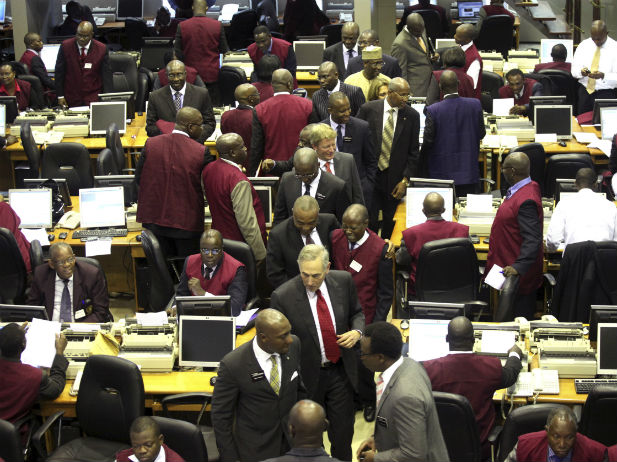Banking stocks suffered the most among 25 top losers in the equities’ market as share price decline left investors with a net capital loss of N372 billion.
There were 10 banking stocks among the top 25 that lost 30 per cent and above in the past eight months. Some of the top losers recorded as much as 60.1 per cent in equities price reduction.
Conversely, only one banking stock made the few top gainers’ within the period. Altogether, there are 15 banking stocks quoted on the Nigerian stock market.
Three other banking stocks recorded various gains, while a bank dropped by 12.3 per cent.
Investors in banking stocks have suffered the highest losses with nearly three-quarters of quoted banking stocks running with double-digit losses. Losses in the banking sector generally significantly outweighed the overall market’s average loss, according to data review by The Nation.
The benchmark indices for the Nigerian stock market indicated eight-month average decline of 3.64 per cent, equivalent to a loss of N372 billion. Aggregate market value of all quoted companies on the Nigerian Stock Exchange (NSE) closed August at N9.479 trillion as against its year’s opening value of N9.851 trillion. The All Share Index (ASI), which tracks prices at the Exchange, dropped to 27,599.03 points by the month-end as against its year’s opening index of 28,642.25 points.
Banking stocks were deep in the red with the troubled Skye Bank leading the top 25 losers with year-to-date loss of 60.13 per cent. The Central Bank of Nigeria (CBN) had sacked the board and management of Skye Bank over corporate governance issues. Diamond Bank followed with a loss of 54.35 per cent. Other top losers in the banking sector included Ecobank Transnational Incorporate, -31.3 per cent; Fidelity Bank, -40.67 per cent; Sterling Bank, -49.18 per cent; Union Bank of Nigeria, -39.13 per cent; Unity Bank, -30.36 per cent; Wema Bank, -34.0 per cent; FBN Holdings, -40.53 per cent and FCMB Group, which market value had dropped by 39.64 per cent. Stanbic IBTC Holdings meanwhile dropped by 12.3 per cent within the period.
While consolidation, steep price declines and emergence of highly capitalised non-bank stocks such as Dangote Cement had reduced the hitherto overwhelming dominance of the market by banking stocks, banking stocks still account for some 25 per cent of the total market value of the Nigerian equities market.
Head, financial advisory group, GTI Capital Group, Mr. Kehinde Hassan, said the negative performance of the banking sector was weighing heavily on the overall market performance.
He noted that the unstable policy environment and the knee-jerk approach of the Central Bank of Nigeria (CBN) to regulatory decisions have compounded the tough operating environment for banks, many of which had warned of lower earnings due to the headwinds.
Only Guaranty Trust Bank (GTB) ranked within the top gainers’ list with 8-month gain of 45.76 per cent. United Bank for Africa (UBA) meanwhile posted a heartwarming return of 28.7 per cent. Access Bank followed with 14 per cent while Zenith Bank, against all expectations, trailed with a modest gain of 6.05 per cent.
Other top losers for the period included Livestock Feeds, -33.1 per cent; UACN Property Development Company, -42.5 per cent; Honeywell Flour Mills, -35.12 per cent; Vitafoam Nigeria, -43.99 per cent; AIICO, -30.77 per cent; Union Homes and Savings, -39.24; Fidson Healthcare, -32 per cent; GlaxoSmithKline Consumer Nigeria, -45.88 per cent; Berger Paints, -31.1 per cent; Cement Company of Northern Nigeria, -35.8 per cent; Lafarge Africa, -40.1 per cent; Portland Paints and Products Nigeria, -53.2 per cent; Forte Oil, -47 per cent; Tourist Company of Nigeria, -43.1 per cent and Caverton Offshore Support Group, which lost 40.9 per cent.
Nigerian equities have writhed under sustained losses in the past 32 months. Aggregate market value of all quoted equities on the NSE closed 2015 at N9.851 trillion as against its opening value of N11.478 trillion for the year, representing a loss of N1.627 trillion. The ASI indicated a negative full-year average return of -17.36 per cent. The ASI closed 2015 at 28,642.25 points as against its opening index of 34,657.15 points.
The losses in 2015 worsened the downtrend that had in 2014 marked out Nigerian equities among the worst-performing stocks globally with average full-year decline of 16.14 per cent. Aggregate market value of all quoted equities had closed 2014 at N11.478 trillion as against its opening value of N13.226 trillion for the year, indicating a loss of N1.75 trillion during the year.
Altogether, investors have lost more than N3.75 trillion in the past 32 months as the stock market groaned under political tension, steep decline in crude oil prices, foreign exchange crisis, uncertain policies and other domestic and global macroeconomic concerns.
The second half of 2016 has however seen considerable share price recovery compared with the steep losses in the first half. In the first quarter alone, Nigerian equities had recorded a net loss of N1.15 trillion.
Notwithstanding the negative overall market situation, many stocks have posted substantial returns so far this year. Dangote Flour Mills, which saw the reemergence of Aliko Dangote’s Dangote Industries Limited as the core investor, recorded the highest gain of 240.7 per cent. E-Tranzact followed with a gain of 97.4 per cent. United Capital returned 74.8 per cent while Total Nigeria posted eight-month return of 63.3 per cent. Other top gainers included Presco, 37.2 per cent; AG Leventis, 43.6 per cent; Union Dicon Salt, 39.3 per cent; Neimeth International Pharmaceutical, 32.6 per cent; DN Meyer, 30 per cent; Seplat Petroleum Development Company, 49.4 per cent; Eterna, 33.7 per cent and RAK Unity, a second-tier stock that posted a year-to-date return of 61.3 per cent.


 Naira3 weeks ago
Naira3 weeks ago
 News4 weeks ago
News4 weeks ago
 Naira4 weeks ago
Naira4 weeks ago
 Naira3 weeks ago
Naira3 weeks ago
 Jobs3 weeks ago
Jobs3 weeks ago
 Travel3 weeks ago
Travel3 weeks ago
 Naira3 weeks ago
Naira3 weeks ago
 Investment4 weeks ago
Investment4 weeks ago





























